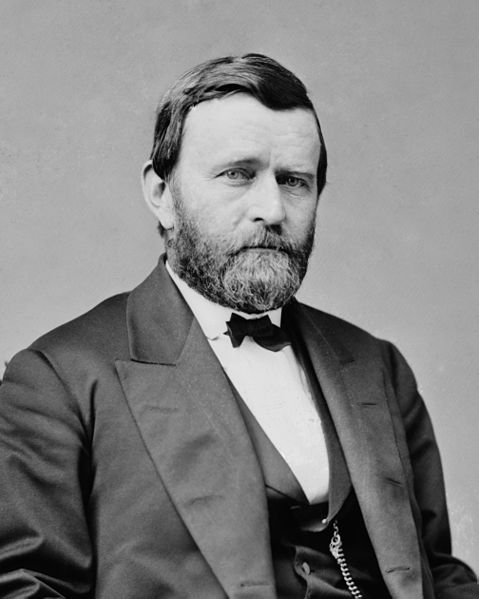The Comstock laws are a set of federal acts passed by the United States Congress under the Grant administration along with related state laws. The "parent" act was passed on March 3, 1873, as the Act for the Suppression of Trade in, and Circulation of, Obscene Literature and Articles of Immoral Use. This Act criminalized any use of the U.S. Postal Service to send any of the following items: obscenity, contraceptives, abortifacients, sex toys, personal letters with any sexual content or information, or any information regarding the above items.
The symbol of Comstock's New York Society for the Suppression of Vice.
Presidency of Ulysses S. Grant
The presidency of Ulysses S. Grant began on March 4, 1869, when Ulysses S. Grant was inaugurated as the 18th president of the United States, and ended on March 4, 1877. The Reconstruction era took place during Grant's two terms of office. The Ku Klux Klan caused widespread violence throughout the South against African Americans. By 1870, all former Confederate states had been readmitted into the United States and were represented in Congress; however, Democrats and former slave owners refused to accept that freedmen were citizens who were granted suffrage by the Fifteenth Amendment, which prompted Congress to pass three Force Acts to allow the federal government to intervene when states failed to protect former slaves' rights. Following an escalation of Klan violence in the late 1860s, Grant and his attorney general, Amos T. Akerman, head of the newly created Department of Justice, began a crackdown on Klan activity in the South, starting in South Carolina, where Grant sent federal troops to capture Klan members. This led the Klan to demobilize and helped ensure fair elections in 1872.

Presidency of Ulysses S. Grant
Ulysses S. Grant by Balling (1865)
Inauguration of President Grant Mathew Brady March 4, 1869
Hamilton Fish, Secretary of State, 1869–1877





